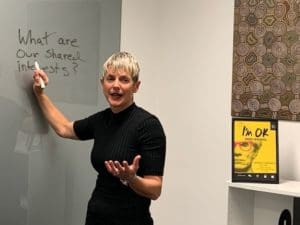The Mediator as a Conduit, Connection as the Key. Member Spotlight: Carolyn Manning
Mediation is not only about talent, ability and communication skills. Being a good mediator also requires a good deal of energy, enthusiasm and above all passion. These qualities are not lacking in Carolyn Manning, whose personality overflows with enthusiasm. Despite being a nationally accredited mediator, Carolyn’s portfolio does not end here. She has over 25 years of experience working as a psychologist, specializing in supporting survivors of trauma. She also works as a consultant for government and private organizations.
A Multifaceted Career
 She is a keen traveler and a curious soul, constantly eager to engage with new challenges, like negotiating upgrades from economy to business class (a negotiation challenge which has yet to bear fruit, she jokes). Her expertise in psychology merged with her interest in conflict resolution as she began work as a consultant seeking to improve companies at the systemic level, helping them shifting from conflict environments to more cooperative ones. After this, she embarked on a career that spanned a range of portfolios including work on the Victorian Civil and Administrative Tribunal as a sessional tribunal member.
She is a keen traveler and a curious soul, constantly eager to engage with new challenges, like negotiating upgrades from economy to business class (a negotiation challenge which has yet to bear fruit, she jokes). Her expertise in psychology merged with her interest in conflict resolution as she began work as a consultant seeking to improve companies at the systemic level, helping them shifting from conflict environments to more cooperative ones. After this, she embarked on a career that spanned a range of portfolios including work on the Victorian Civil and Administrative Tribunal as a sessional tribunal member.
She has coached mediation students at Bond University and the Institute of Arbitrators and Mediators of Australia (now the Resolution Institute). She has also published academic articles on workplace mediation, presented workshops on mediation for employers across Australia, facilitated conflict management workshops for indigenous groups on native title and produced a DVD on mediation in the workplace which has sold nationally.
Carolyn’s strong desire to help others has led her to volunteer for a number of organizations including the Dispute Settlement Centre of Victoria, Lifeline, the Victorian AIDS Council and Big Brothers Big Sisters of Australia that provides mentoring to socially disadvantaged Youth. She has also worked independently as an advocate for people in rural and remote communities to make it easier for them to access mental health services across Australia.
Origins of Conflict
For over fifteen years, Carolyn has employed her skills as a psychologist and mediator to re-align the perceptions of parties in conflict across workplaces throughout Australia by “shifting narratives dominated by distrust and blame. Sometimes conflict can be based on competition for resources, other times conflict has its origins in power and status. But other times, at the interpersonal level, misunderstanding can be the cause of conflict.”
She adds, “Conflict can be talked about, acted out, avoided, concealed or suppressed. The symptoms of conflict are often expressed via poor communication or no communication which of course contributes to distrust and the demonization of the other. Creating a space where people feel safe to hear from each other, sometimes for the first time, is an important part of transforming the conflict narrative. By doing this we open up the possibility of uncovering shared interests that encourage cooperation and respectful communication. If conflict is swept under the rug, it can spread like a virus crossing borders (e.g. Democratic Republic of the Congo, Syrian civil war, etc) or in the case of workplaces it may start out at an interpersonal level, involving two people for example and spread, because colleagues are enlisted into the dispute thus destabilizing the workplace.
“For example, during one mediation, I uncovered the source of conflict in the workplace, which was role confusion. This has resulted in a territorial dispute over responsibilities following a restructure. This was unearthed during the mediation process because I was curious about how an otherwise stable and productive relationship has managed to deteriorate in a relatively short-time creating distrust and animosity between the two parties.”
Carolyn is keen to underline the importance of how individuals communicate with each other. For example, if parties remain physically and psychologically distant, it becomes easier to demonize each other, raising barriers and perpetuating or escalating the conflict. At the heart of conflict resolution stands the capacity of the mediator to assist in healing connections amongst opposing parties, constructing a communicative bridge between two parted shores. “When people get to know each other, it’s harder to hate. They start to re-discover their shared humanity and a genuine connection becomes possible.” The enhancement of inter-personal connections are not everything, but it can form the foundation for a wider resolution and the prevention of future conflicts. Carolyn is convinced that “from little things, big things grow,” quoting the famous singer Paul Kelly to express the core of her thinking about conflict and change.
MBBI: Giving People a Voice
 Carolyn became interested in the work of MBBI over eight years ago, being inspired by the worldwide commitment of the organization at the grassroots level of peacebuilding, something that is often neglected by high profile organizations. “I was attrached by the MBBI philosophy, namely the fact that the driving force of its efforts is to give a voice to people who don’t have one.” The reason why MBBI is important is that it creates opportunities for parties to come together and connect in a respectful way, that otherwise may not have been possible. Carolyn is a founding member of the Australian Regional Group of the MBBI Oceania Chapter. Despite its embryonic status, she hopes one day this Chapter will support Asian-Pacific nations with mediation expertise and capacity-building know-how.
Carolyn became interested in the work of MBBI over eight years ago, being inspired by the worldwide commitment of the organization at the grassroots level of peacebuilding, something that is often neglected by high profile organizations. “I was attrached by the MBBI philosophy, namely the fact that the driving force of its efforts is to give a voice to people who don’t have one.” The reason why MBBI is important is that it creates opportunities for parties to come together and connect in a respectful way, that otherwise may not have been possible. Carolyn is a founding member of the Australian Regional Group of the MBBI Oceania Chapter. Despite its embryonic status, she hopes one day this Chapter will support Asian-Pacific nations with mediation expertise and capacity-building know-how.
Finally, Carolyn recently took part in the 2019 MBBI International Congress in Bali, Indonesia. This left her impressed and stimulated by the work of hundreds of peacebuilders around the globe, as well as by the energy and enthusiasm of MBBI’s vibrant community and personalities.
The inspiration drawn by the Congress, led Carolyn to write a brief riff tribute to MBBI:
What is MBBI’s Role?
It is to innovate?
Contemplate?
Initiate?
Should we mitigate?
Participate?
Engage debate?
Not ruminate?
Consolidate?
Or mediate?
Negotiate?
A new mandate – to alleviate not obliterate
This new shared fate
That we celebrate
Written by Matteo Piovacari: MBBI Writer
